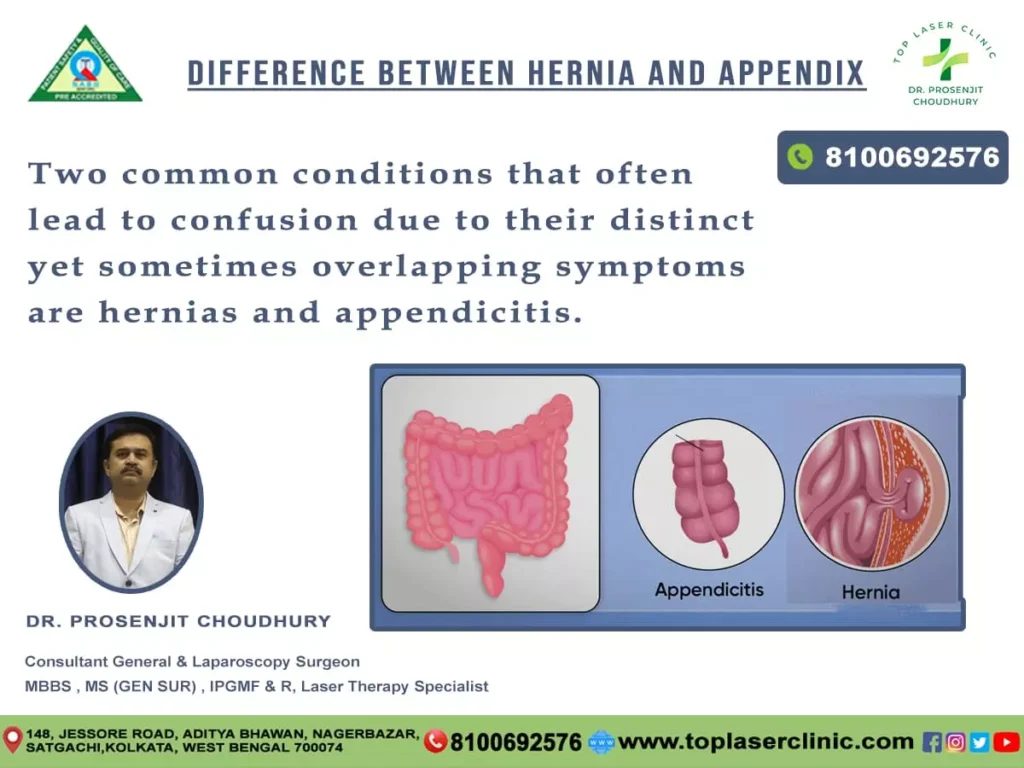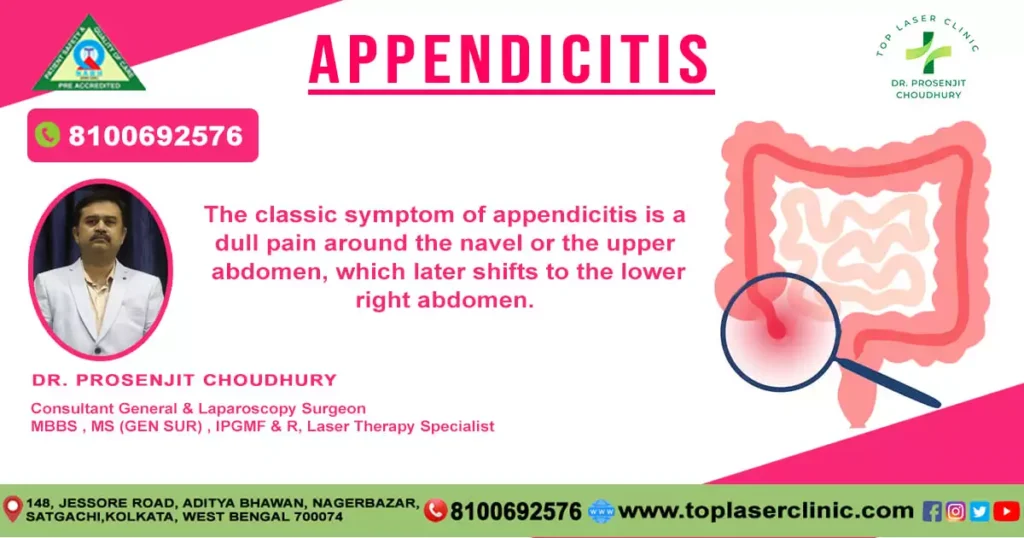
Table of Contents
The human body, an intricate marvel, often encounters diverse maladies. Among the multitude of health concerns, abdominal issues frequently arise, presenting puzzling symptoms that sometimes overlap.
Two common conditions that often lead to confusion due to their distinct yet sometimes overlapping symptoms are hernia and appendicitis. Despite both affecting the abdominal region, they are fundamentally different in nature, causes, symptoms, and treatment. In this blog post we’ll learn the variances: Hernia vs. Appendicitis.
Hernia:

A hernia occurs when an internal organ or fatty tissue protrudes through a weak spot in the surrounding muscle or connective tissue, forming a bulge. This commonly transpires in the abdominal or groin area.
Various types of hernias exist, including inguinal (inner groin), femoral (outer groin), umbilical (around the belly button), and incisional (through a scar or previous surgical incision).
The primary causes of a hernia involve increased pressure on the abdominal wall, resulting from factors such as heavy lifting, persistent coughing, constipation, obesity, or even pregnancy. Symptoms typically include a noticeable bulge or lump in the affected area, discomfort, aching, or a dragging sensation, particularly when lifting heavy objects or during activities that strain the abdominal muscles.
Appendicitis:
Appendicitis, on the other hand, pertains to the inflammation of the appendix, a small, finger-shaped pouch located on the lower right side of the abdomen.
The exact cause of appendicitis remains unclear but is often associated with blockages in the appendix, leading to bacterial overgrowth and subsequent inflammation.
This condition requires immediate medical attention as a burst appendix can result in severe complications and, in some cases, be life-threatening.

The classic symptom of appendicitis is a dull pain around the navel or the upper abdomen, which later shifts to the lower right abdomen.
Other indications encompass loss of appetite, nausea, vomiting, fever, and tenderness in the affected area. If left untreated, the appendix can rupture, causing the spread of infection throughout the abdominal cavity.
Distinguishing Factors:
Hernia vs. Appendicitis
While both hernias and appendicitis can cause abdominal discomfort, a few key distinctions aid in differentiating between the two conditions:
- Location: Hernias typically manifest as a visible bulge in the abdomen or groin area due to protruding tissue. Appendicitis, however, causes pain and tenderness in the lower right abdomen.
- Symptoms: Hernias often result in localized discomfort, while appendicitis tends to cause more widespread pain accompanied by additional symptoms like nausea, vomiting, fever, and loss of appetite.
- Causes: Hernias generally occur due to muscle weakness and increased pressure on the abdomen, while appendicitis is often caused by a blockage in the appendix, leading to inflammation and subsequent infection.
Treatment:
Hernias often require surgical intervention to repair the weakened area and put the protruding tissue back in place. In contrast, appendicitis almost always necessitates emergency surgery to remove the infected appendix and prevent it from bursting.
In essence, while both hernias and appendicitis present abdominal discomfort, understanding their distinctive characteristics and symptoms is crucial for accurate diagnosis and prompt treatment. Seeking medical attention for a proper evaluation and diagnosis is imperative in addressing these conditions effectively, ensuring appropriate management and the restoration of good health.
Which food should be avoided with apendicitis?
Fried junk food and those foods are cooked in excess oil and spices should be avoided to manage appendicitis effectively.
At what age people get hernia?
People of all ages can get an inguinal hernia. In kids it is more common in boys but girls can get affect too.
At what age people get appendicitis?
Appendicitis most often occurs between the ages of 10 and 30. Since the healthcare provider will recommend surgery to remove the appendix. After a surgery, people can lead a normal life without an appendix.
Which is more dangerous hernia or appendicitis?
Both hernia and appendicitis are equally life-threatening if not treated and cured on time.